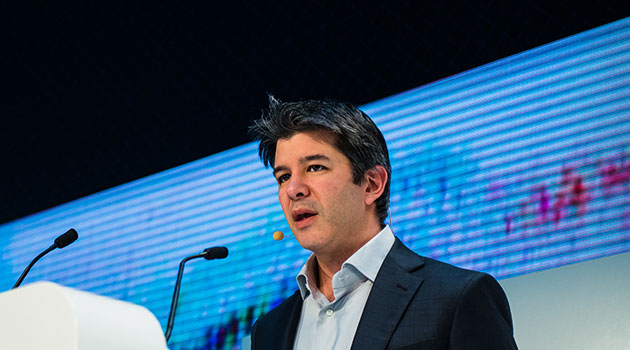Bombastic and brutal. Hot headed. Bro culture personified.
Travis Kalanick has acquired a lot of bad ink—and a worse reputation—since blazing onto the Silicon Valley scene as co-founder of Uber and head of the rideshare revolution. But the cocky CEO seemed to skip town this week as the company he once ran was accused in court of stealing trade secrets from a corporate rival. Instead, a much gentler delegate appeared to testify on his behalf.
Clad in a dark suit, light shirt, and dark tie, Kalanick made his way to the U.S. District Court for the Northern District of California in San Francisco on Tuesday after being called as a witness in a lawsuit that was filed against Uber last year by Waymo, Google’s self-driving subsidiary.
It was his first public appearance since being forced to resign as Uber CEO last summer, and the anticipation was palpable.
The reality was something else.
Over the course of two days and just over an hour of testimony, Kalanick proved a cool customer on the stand. He was acquiescent; soft-spoken; respectful. The one sign of his nervousness—a compulsion to sip out of tiny water bottles provided by the court—was even relatable.
And he registered genuine emotion when asked to describe his former role at the rideshare company, his voice audibly cracking as he recounted the early days at Uber, looking over a team of six and dreaming of what the app could accomplish.
He also seemed ready for Waymo’s lawyers, who confronted him with a barrage of his own previous statements—mostly made through subsequently deleted text messages—that ran from "bro-y" to bloodthirsty.
Some of the more incendiary remarks seemed to have conveniently slipped his mind. A mysterious request for a “pound of flesh” on an Uber wish list attributed to the ex-CEO didn’t stir any specific memories. The same amnesia hit when he was asked about a text he sent to former Waymo employee/accused stealer of trade secrets Anthony Levandowski, which simply read: “1. Burn the village.”
Still, he freely admitted to knowledge of other communiques, including a text sent from Levandowski that linked to the “Greed is Good” speech from the movie Wall Street, accompanied by two winking emojis. (The message was a subject of fascination for the court, with lawyers spending copious amounts of time arguing over whether the clip could be shown to the jury.)
And the sincere embrace of his penchant for bro-speak may have also worked in Kalanick’s favor when he was asked to explain a note that read: “Cheat codes. Find them. Use them.”
Waymo’s attorneys undoubtedly hoped to insinuate the term was an admission of Uber’s pursuit of ill-gotten gains to get ahead of their self-driving competitors, and head attorney Charles Verhoeven repeatedly called out its usage in the video game world as a way to reach the next level without putting in the work.
But Kalanick offered a much different definition, saying the phrase was shorthand for “elegant solutions to problems that haven’t already been thought of.” He even offered several examples including the Uber feature that lets customers know approximately how long they’ll have to wait for their ride. In the context of a trial where terms like “jam sesh” also made the official record (Kalanick definition: getting “a bunch of interesting and creative people in a room and eventually it becomes something interesting and innovative”) his explanation seemed to fit the bill.
Released from court and freed from any subpoenas Wednesday afternoon, Kalanick left having done the best he could for his former company, though it may not have been enough.
In a surprise turn of events, a settlement was announced on Feb. 9 in which Uber agreed to pay Waymo $244.8 million in equity, giving Google’s self-driving start-up a 0.34% stake in the rideshare company. Though Waymo originally sought $2.6 billion in damages, the lawsuit’s damage to Uber’s already wounded reputation could be compensation enough.
